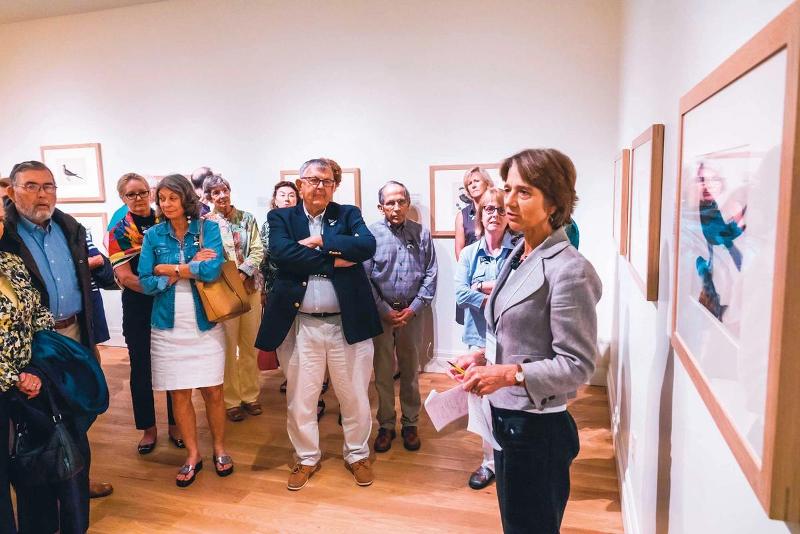In the world of art museums, few subjects have sparked as much controversy as the role of docents. These volunteer educators, often associated with a predominantly white, upper-middle-class demographic, have become a focal point in the ongoing battle for inclusivity and change. This article delves into the recent clash at the Art Institute of Chicago and explores the broader paradigm shift happening in museums across the United States. Join us as we examine the push for paid educators, the retraining of docents, and the evolving landscape of museum visitor experiences.
The Art Institute of Chicago's Docent Controversy
Explore the heated debate surrounding the suspension of the docent program at the Art Institute of Chicago and its implications for class and income equity.
The decision by the Art Institute of Chicago (AIC) to suspend its docent program in favor of paid educators ignited a firestorm of controversy. Many docents felt dismissed and labeled the move as 'reverse racism'. This subheading delves into the details of the AIC's decision and the ensuing debate.
Despite the initial suspension, the AIC ultimately reinstated both volunteers and paid educators, aiming to strike a balance between tradition and progress. We'll explore the motivations behind this decision and the ongoing efforts to address issues of class and income equity in the museum setting.
The Shift Towards Paid Educators
Discover why museums are opting for paid educators over volunteer docents and the impact it has on visitor experiences.
Museums across the United States are reevaluating the role of docents and embracing a shift towards paid educators. This subheading examines the reasons behind this trend and the potential benefits it brings.
By employing paid educators, museums aim to enhance visitor experiences, ensure specialized knowledge, and address the need for diversity and inclusivity. We'll delve into the advantages of this approach and its implications for the future of museum education.
Retraining Docents for a Changing Landscape
Explore the challenges and opportunities involved in retraining docents to adapt to a more interactive and inclusive museum environment.
Shifting away from lecture-based tours, museums are retraining docents to embrace a more interactive and inclusive approach. This subheading delves into the challenges faced by docents during this transition and the opportunities it presents.
The Importance of Comprehensive Retraining
Comprehensive retraining programs, including mandatory equity training, are crucial to equip docents with the necessary skills to navigate sensitive topics and engage visitors from diverse backgrounds. We'll explore the impact of these programs and the ongoing efforts to support docents in their evolving roles.
Attracting a Younger, More Diverse Guide Pool
Museums are also implementing initiatives to attract a younger and more diverse group of volunteer guides. We'll discuss these programs and their role in fostering a more inclusive and representative museum community.
The Role of Docents in Addressing Race and Politics
Examine the importance of specialized training for docents in navigating artworks that deal explicitly with race and politics.
As museums increasingly showcase artworks that explore race and politics, it becomes crucial for docents to receive specialized training. This subheading delves into the significance of equipping docents with the knowledge and skills to navigate these sensitive subjects.
Without proper training, docents may unintentionally avoid discussing race or lack an understanding of the historical context, which can hinder meaningful engagement with artworks. We'll explore the implications of this issue and the steps museums are taking to address it.
The Future of Docents in Museums
Consider the evolving role of docents in museums and the potential impact of unionization and changing labor practices.
The role of docents in museums is undergoing significant changes, and the future remains uncertain. This subheading explores the potential outcomes and challenges that lie ahead.
As museums grapple with labor practices and increasing unionization, the reliance on unpaid docents may be reconsidered. We'll discuss the implications of these shifts and the ongoing efforts to redefine the role of docents in the museums of the future.
Conclusion
The role of docents in museums is a subject of ongoing debate and transformation. Museums are striving to create more inclusive and engaging visitor experiences by reevaluating the traditional docent model. The suspension and subsequent reinstatement of docent programs at the Art Institute of Chicago serve as a testament to the complexities involved in addressing issues of equity and diversity.
Through retraining initiatives and the integration of paid educators, museums are adapting to the changing landscape and seeking to provide visitors with a more interactive and inclusive environment. The future of docents in museums remains uncertain, but the ongoing efforts to redefine their role reflect a commitment to progress and a desire to tell new stories.
FQA
What is the role of docents in museums?
Docents are volunteer educators who guide visitors through museums, providing information and insights about the artworks on display.
Why are museums shifting towards paid educators?
Museums are opting for paid educators to enhance visitor experiences, ensure specialized knowledge, and address issues of diversity and inclusivity.
How are docents being retrained for the changing museum landscape?
Docents are undergoing comprehensive retraining programs, including mandatory equity training, to adapt to a more interactive and inclusive approach in museum education.
Why is specialized training important for docents in addressing race and politics?
Specialized training equips docents with the knowledge and skills to navigate artworks that deal explicitly with race and politics, ensuring meaningful engagement and avoiding the avoidance of sensitive subjects.
What does the future hold for docents in museums?
The future of docents in museums is uncertain, as changing labor practices and increasing unionization may impact the reliance on unpaid docents. The role of docents is likely to continue evolving as museums strive for inclusivity and engage with new narratives.

